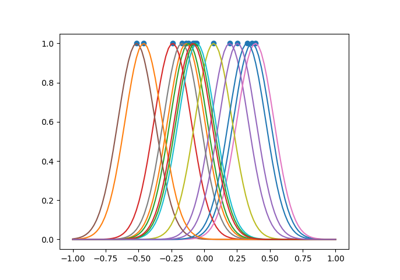landmark_shift_registration#
- skfda.preprocessing.registration.landmark_shift_registration(fd, landmarks, location=None, *, restrict_domain=False, extrapolation=None, grid_points=None)[source]#
Perform a shift of the curves to align the landmarks.
Let \(t^*\) the time where the landmarks of the curves will be aligned, \(t_i\) the location of the landmarks for each curve and \(\delta_i= t_i - t^*\).
The registered samples will have their feature aligned.
\[x_i^*(t^*)=x_i(t^* + \delta_i)=x_i(t_i)\]- Parameters:
fd (FData) – Functional data object.
landmarks (ArrayLike) – List with the landmarks of the samples.
location (float | Sequence[float] | Callable[[ndarray], float | Sequence[float]] | None) – Defines where the landmarks will be alligned. If a numeric value is passed the landmarks will be alligned to it. In case of a callable is passed the location will be the result of the the call, the function should be accept as an unique parameter a numpy array with the list of landmarks. By default it will be used as location \(\frac{1}{2}(max( \text{landmarks})+ min(\text{landmarks}))\) wich minimizes the max shift.
restrict_domain (bool) – If True restricts the domain to avoid evaluate points outside the domain using extrapolation. Defaults uses extrapolation.
extrapolation (Evaluator | typing_extensions.Literal[bounds, exception, nan, none, periodic, zeros] | None) – Controls the extrapolation mode for elements outside the domain range. By default uses the method defined in fd. See extrapolation to more information.
grid_points (Union[ArrayLike, Sequence[ArrayLike]] | None) – Grid of points where the functions are evaluated in
shift().
- Returns:
Functional data object with the registered samples.
- Return type:
Examples
>>> from skfda.datasets import make_multimodal_landmarks >>> from skfda.datasets import make_multimodal_samples >>> from skfda.preprocessing.registration import ( ... landmark_shift_registration, ... )
We will create a data with landmarks as example
>>> fd = make_multimodal_samples(n_samples=3, random_state=1) >>> landmarks = make_multimodal_landmarks(n_samples=3, random_state=1) >>> landmarks = landmarks.squeeze()
The function will return the sample registered
>>> landmark_shift_registration(fd, landmarks) FDataGrid(...)

